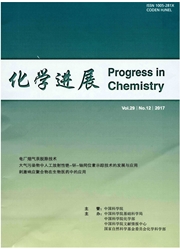

 中文摘要:
中文摘要:
有机硝酸酯是大气中挥发性有机物与自由基反应的产物,半挥发性的气相有机硝酸酯可以通过氧化反应或气粒分配作用进入颗粒相,是二次有机物的一个重要组成部分,逐渐引起大气化学研究者的广泛关注。颗粒相有机硝酸酯具有分子种类众多、理化性质复杂的特点,其全组分的测定有较高的难度,故目前开展的研究还较为有限。基于近年来国内外相关研究,本文对大气颗粒物中有机硝酸酯的形成机制、测定技术和估算方法进行了总结。随着测定技术的不断发展,外场观测已成为颗粒相有机硝酸酯的主要研究方法。热解析管激光诱导荧光系统(TD-LIF)和气溶胶质谱(AMS)为颗粒相有机硝酸酯的总量估算提供了方法,同时其较高时间分辨率的测定方法也为研究有机硝酸酯的大气行为提供更多信息。化学电离源质谱(CIMS)可以提供颗粒相有机硝酸酯的分子信息,有望在外场观测中得到广泛运用。在未来研究中,将外场观测研究、模型模拟和烟雾箱模拟实验相互结合,以实现对颗粒相有机硝酸酯的前体物追踪、大气化学过程的深入了解,为揭示大气颗粒物中有机硝酸酯的生成机制提供新的方向。
 英文摘要:
英文摘要:
Particulate organonitrates are formed from volatile organic compounds( VOCs) oxidation by radicals.A portion of semi-volatile gas-phase organonitrates can be incorporate into aerosol by oxidation reactions or portioning, and has been an important component of secondary organic aerosol( SOA). Particulate organonitrates study has become one of the important aspects of atmospheric chemistry. Given the large number and variability of chemical constituents, and possible chemical transformations of organonitrates, such characterization presents a key problem for research. Based on recent research progress on particulate organonitrates,this paper summarizes the formation mechanism and quantification method of particulate organonitrates. Profiting from the application of high time resolution techniques,field measurements has become the major approach of particulate organonitrates study. Thermal dissociation-laser induced fluorescence( TD-LIF) and aerosol mass spectrometers( AMS) have been used to quantify and provide the evolution processes of particulate organonirates. M eanwhile,chemical ionization mass spectrometer( CIMS) allows for the determination of molecular ion composition of organonitrates, promising to become the important direction of study ofparticulate organonirates in future field measurements. To have a deep insight on precursor and atmospheric chemistry processes of particulate organonirates, future research should focus on the combination of field measurement,modeling simulation and laboratory simulation,and these will also lead to a more comprehensive understanding of formation mechanism of particulate organonirates.
 同期刊论文项目
同期刊论文项目
 同项目期刊论文
同项目期刊论文
 期刊信息
期刊信息
